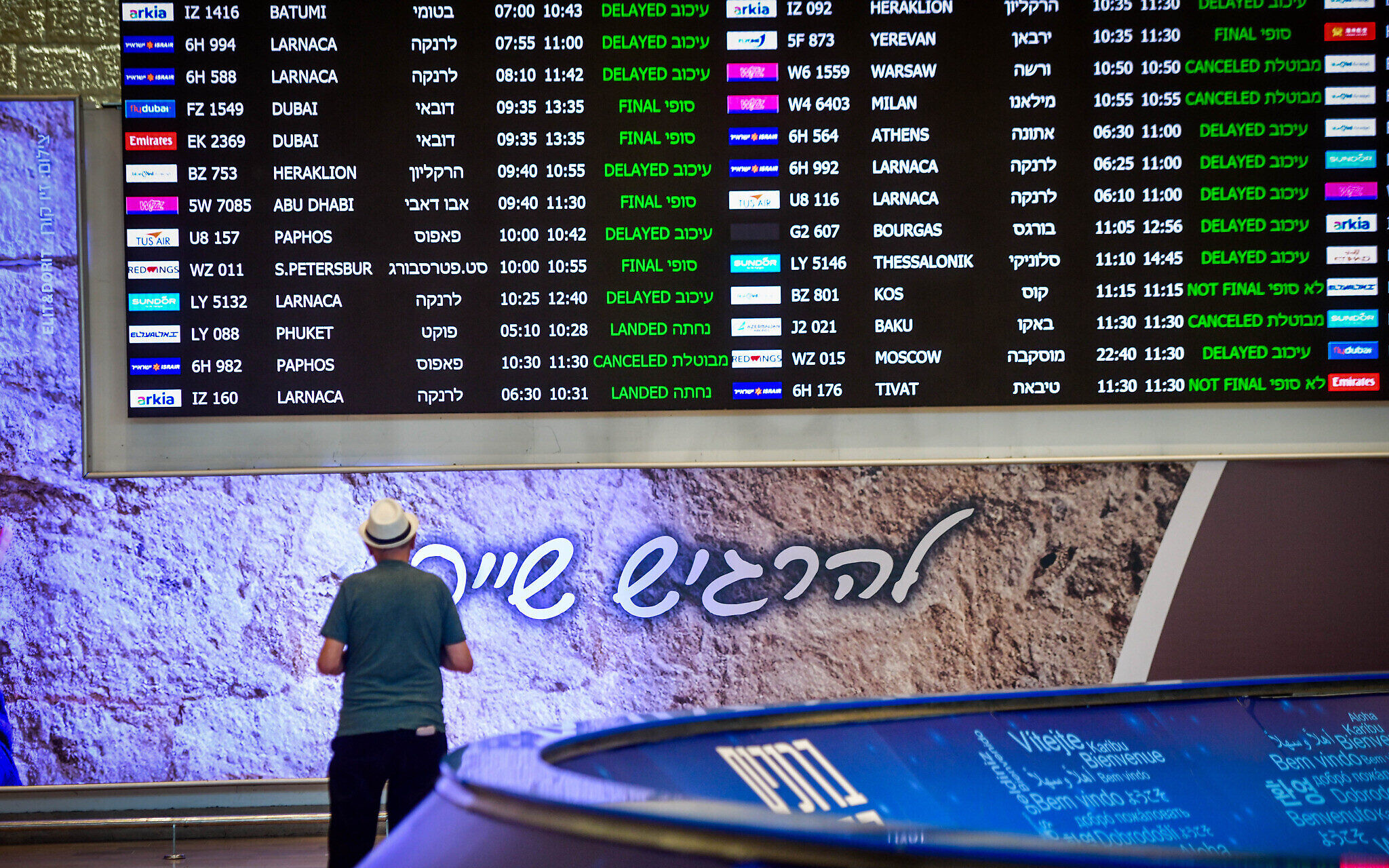Travelers faced initial chaos and ongoing uncertainty at Ben Gurion Airport after activity was suspended for a couple of hours early Sunday morning amid a preemptive Israel Defense Forces strike on Hezbollah launchers primed to target central Israel.
Incoming flights were diverted, while outbound travel was paused from the airfield.
A number of foreign airlines including Air France, Aegean and Wizz — which were still serving Israel this month despite many carriers having canceled their flights through August — scrapped all their flights to and from Israel on Sunday.
The Israel Airports Authority announced that Ben Gurion, which closed at 5:20 a.m., was open and resuming operations at 7 a.m., but a message on the airport’s website urged passengers to double-check their flights as the airport and airlines tried to get back to full function.
Ben Gurion Airport director general Udi Bar Oz told reporters at noon that the flight schedule was slowly returning to normal.
He said the flight schedule was being “stabilized”: “It will be a complicated day but it’s under control. Most of the flights will depart… As the day progresses, the delays will be reduced,” he said. “We suggest passengers keep updated with their airline companies and come to the airport three hours before their flight.”
Bar Oz said 310 international flights were scheduled for the day, with over 50,000 passengers, on Israeli airlines and some 20 foreign airlines “which are continuing to fly [to and from Israel] today, tomorrow and the day after that.” Some foreign airlines canceled Sunday’s flights, he confirmed, and they were being contacted to establish when they would resume.
Israel’s national airline, El Al, announced that its flights were resuming “after some adjustments.”
“We’re working to stabilize the flight board as soon as possible and recommend all passengers confirm their updated time of departure before leaving for the airport on the El Al and IAA websites,” the airline said in a statement.

Passengers at Ben Gurion International airport amid multiple delayed and cancelled flights on August 25, 2024 (Avshalom Sassoni/Flash90)
El Al added that flights that had been diverted to other, unspecified, airports would resume their journeys to Ben Gurion.
Israeli low-cost airline Arkia also said it was going back to normal.
“There may be updates to some of the departure times in the next few hours which the passengers will be notified of,” the airline noted.
Israel’s other low-cost airline, Israir, posted updates to its website showing that the majority of its flights were delayed on Sunday.
Despite the announcements that the skies were open and Israeli airlines were back to normal, the system struggled to operate smoothly in the first couple of hours Sunday morning.
Earlier this month, tens of thousands of Israelis were left stranded abroad due to a wave of cancellations by foreign airlines amid rising tensions between Israel and Iran and Hezbollah.

An El Al plane arrives from France at Ben Gurion airport near Tel Aviv, August 1, 2024. (Tomer Neuberg / Flash90)
“The flight board is completely messed up. Going back to normal won’t be so quick,” sources quoted by Channel 12 said earlier Sunday.
Channel 12 footage at 9 a.m. showed the entry hall at the airport full of passengers, some of whom arrived to discover their flights would not take off.
The airport closed at 5:20 a.m. after Israel launched a massive preemptive strike against thousands of Hezbollah targets in Lebanon to thwart a massive attack the IDF said was planned to target Israel’s center and north on Sunday morning.
The Lebanese terrorist organization then fired over 200 rockets and drones at Israel in what it said was retaliation for Israel’s killing of commander Fuad Shukr at the end of last month.
Since October 8, Hezbollah-led forces have attacked Israeli communities and military posts along the border on a near-daily basis, with the group saying it is doing so to support Gaza amid the war against the Hamas terror group there.
So far, the skirmishes have resulted in 26 civilian deaths on the Israeli side, as well as the deaths of 19 IDF soldiers and reservists. There have also been several attacks from Syria, without any injuries.

This photo taken from a position in northern Israel shows a Hezbollah drone intercepted by Israeli air defense over north Israel on August 25, 2024 (Jalaa MAREY / AFP)
Hezbollah has named 428 members who have been killed by Israel during the ongoing skirmishes, mostly in Lebanon but some also in Syria. In Lebanon, another 73 operatives from other terror groups, a Lebanese soldier, and dozens of civilians have been killed.
The terrorist organization initially refused to release the number of terrorists killed in Israel’s Saturday night-early Sunday attack.











